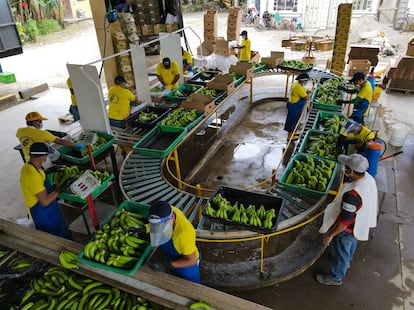Kremlin opens trade war with Ecuador over transfer of ‘scrap metal’ Russian arms to US
Moscow has partially prohibited imports from Quito under suspicion that the Soviet-origin weapons to be exchanged with Washington for ‘modern’ materiel will end up in Ukraine

The Kremlin has opened a trade war with Ecuador over its plans to exchange its Soviet-origin weapons for modern U.S. materiel. Moscow suspects that Quito’s armament of Russian and Ukrainian origin — which forms a significant part of the arsenals of Latin American armies — will subsequently be transferred to Kyiv for the war effort against the Russian invasion and has partially vetoed imports of Ecuadorian bananas in retaliation. Moreover, this blockade threatens to go further: the Russian government announced Tuesday the arrival of “the first batch of bananas sent from India to Russia,” at the same time as threatening to restrict the import of Ecuadorian carnations ahead of Valentine’s Day.
The Russian veto is a serious blow to Ecuadorian trade. According to the Central Bank of Ecuador (BCE), Moscow accounted for one-fifth of Ecuador’s banana exports last year. The BCE estimates that Quito’s income from trade in the fruit reached $689 million dollars between January and November 2023.
During January, Quito and Washington negotiated a military exchange whose repercussions might be felt on the European front. Ecuador, ravaged by organized crime, would receive materiel it considers “modern” worth $200 million in exchange for sending Washington weapons that fit the standards of the Ukrainian army. According to a report by the International Institute for Strategic Studies, Quito’s arsenal includes BM-21 Grad multiple rocket launchers, Mi-8 and Mi-17 helicopters, and Strela-2 and Igla man-portable air defense systems.
The Kremlin, in parallel, has taken steps to cut its commercial ties with Ecuador, at least partially. The Federal Service for Veterinary and Phytosanitary Supervision, Rosselkhoznadzor, in early February banned the import of bananas from five Ecuadorian companies on the pretext that it had allegedly detected the contamination of some batches with the Megaselia scalaris fly. However, Moscow, concerned about shortages and the inflated prices paid by its citizens in markets due to Western sanctions, sought an alternative to the Ecuadorian banana before applying its veto.
Rosselkhoznadzor confirmed in a statement Tuesday that the first batch of Indian fruit arrived “in January.” This shipment could not have happened overnight, as the agency itself acknowledges that the next shipment is not expected “until the end of February.” It also stated that “the volume of Indian banana exports to the Russian market will be increased” in the future.
“We have notified the Ecuadorian authorities of Russia’s position: the Americans do not need this equipment, the more so since it was called scrap metal,” the Russian ambassador to the Latin American country, Vladimir Sprinchan, said on January 11. “It is needed by those who know how to handle Russian-made equipment. We warned the authorities that this would be an unfriendly step.”
Ecuadorian President Daniel Noboa stated in an interview at the end of January that the armaments were useless, an assertion that annoyed the Russian authorities due to the wide use of these arsenals on the Ukrainian front. “We have proved that it is scrap metal. In accordance with international agreements, military equipment cannot be transferred, but such scrap metal can be,” the Ecuadorian president said.
“Our partners are well aware of the provisions of the contracts, which include an obligation to use the supplied equipment for the stated purposes and not to transfer it to a third party without obtaining the relevant agreement of the Russian side,” Russian Foreign Ministry spokeswoman Maria Zakharova responded, adding that the decision had been taken in Quito due to “serious pressure from external stakeholders.”
The pressures on Ecuador are not limited only to its primary market with Russia. Another sector, as small as it is symbolic, also being vetoed by the Kremlin. Moscow has asked several European Union member states to prevent the entry of carnations from Ecuador because of another alleged infestation, on this occasion of the invasive western flower thrips (Frankliniella occidentalis). The request was lodged a little over a week before a date on which Russians flock to flower shops: Valentine’s Day.
The impact of the veto on the Ecuadorian flower market would be minimal, as Russians spend just under $1 million per year on bouquets imported from the Latin American country. However, Moscow’s move is striking: the Kremlin has turned to some of the European nations that have provided the largest amounts of military and financial support to Ukraine just days after the EU approved a €50 billion package for Kyiv.
Sign up for our weekly newsletter to get more English-language news coverage from EL PAÍS USA Edition
Tu suscripción se está usando en otro dispositivo
¿Quieres añadir otro usuario a tu suscripción?
Si continúas leyendo en este dispositivo, no se podrá leer en el otro.
FlechaTu suscripción se está usando en otro dispositivo y solo puedes acceder a EL PAÍS desde un dispositivo a la vez.
Si quieres compartir tu cuenta, cambia tu suscripción a la modalidad Premium, así podrás añadir otro usuario. Cada uno accederá con su propia cuenta de email, lo que os permitirá personalizar vuestra experiencia en EL PAÍS.
¿Tienes una suscripción de empresa? Accede aquí para contratar más cuentas.
En el caso de no saber quién está usando tu cuenta, te recomendamos cambiar tu contraseña aquí.
Si decides continuar compartiendo tu cuenta, este mensaje se mostrará en tu dispositivo y en el de la otra persona que está usando tu cuenta de forma indefinida, afectando a tu experiencia de lectura. Puedes consultar aquí los términos y condiciones de la suscripción digital.








































